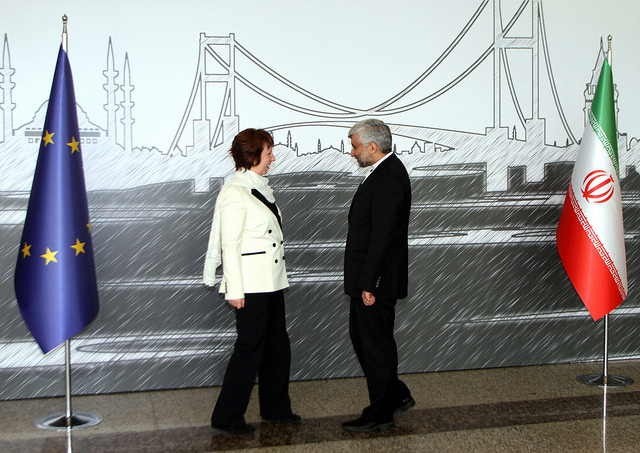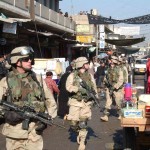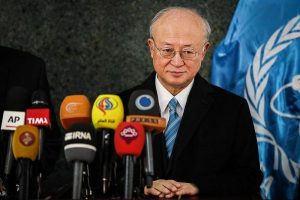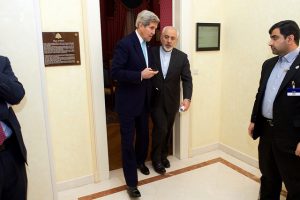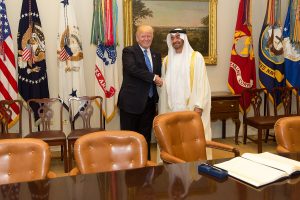by Wayne White
The latest round of frustrating nuclear talks between Iran and the International Atomic Energy Agency (IAEA) and its next session with the P5+1 (the US, Britain, France, Russia, China plus Germany) set for February 26 have generated more arguments that Western demands are excessive and Western concessions insufficient to merit a serious response from Tehran. Likewise, there are renewed assertions that Iran should be entitled to continue its nuclear enrichment program much as it wishes, why Tehran is therefore justified in standing its ground, how continuing assurances on the part of the Iranian regime that it has no interest in nuclear weapons should be taken at face value, and that continued Israeli and US threats of potential military action against Iran are mostly bluff.
Yet, although I sympathize with some of these arguments, it seems clear that key players like the IAEA, the P5+1 and most significantly of all, Israel and the US, remain unimpressed and probably will not change their position that Iran ultimately may be seeking a nuclear weapons capability and therefore must be convinced (or somehow compelled) to downgrade its nuclear enrichment program.
And, personally, I do not find it as easy as some others to brush aside years of UN resolutions, Iranian concealment and suspicions concerning Iran’s nuclear program cited by the IAEA and a number of governments as utterly without foundation (especially after seeing examples of Tehran’s duplicity on other issues I observed while inside the US Intelligence Community). Iran’s simultaneous pursuit of an aggressive ballistic missile program also is troubling in this overall context. Finally, amidst obviously deceptive Iranian assurances concerning the fairness of national elections, highly suspect denials of its thousands of human rights abuses, and so on, I am leery about dismissing all doubts about the ultimate aims of Tehran’s nuclear program based merely on various official regime claims of disinterest in — or opposition to — the acquisition of nuclear weapons.
Admittedly, the various parties pressing the Iranian regime for a robust inspection regime and a downgrade of its enrichment program could be the victims of a certain amount of “groupthink.” After all, as many argue, the UK, the US and others possessing supposedly impressive intelligence capabilities were wrong about Iraq’s nuclear, WMD and missile programs back in 2003. That devastating and (to a considerable extent on the US side) politically-driven blunder was especially galling because monitoring agencies had been given unprecedented access to relevant Iraqi facilities after Iraq’s defeat in 1991, oversaw the destruction of much of the capabilities in question and had a vast database from which more accurate conclusions could have been drawn.
The Iranian case, however, is not a valid parallel. The international community has never had anything approaching such sweeping access on the ground to what Iran has been working on (especially in recent years), so doubts about what it has been doing are less surprising. While this does not mean all officially stated concerns about Iran are on target, likewise it may be a tad cavalier to dismiss most all doubts about Tehran’s nuclear intentions.
And, naturally, it is troubling that some writers on opposite sides of this debate appear to have assumed, effectively, roles similar to those of prosecutors or defense attorneys. On one side are those who seem determined to ignore all inconsistencies that could undermine allegations of suspicious or questionable Iranian nuclear activity. Then, at the other end of the spectrum, there are those who appear to have little doubt that most everything Iran says in its defense is valid, and all accusations and concerns to date are without any merit. As each phase of this impasse plays out, often I find myself caught in the middle — unconvinced by some allegations, but concerned about a few others, and with suspicions that Tehran has neither revealed all its nuclear activities nor, possibly, accurately described its ultimate intentions.
Word of a new “serious and substantial” P5+1 offer in upcoming talks with Iran is not all that heartening since all my hopes of breakthroughs at various other junctures have been dashed. Thus, I remain dubious about some of the actions of all three sides in this controversy: Tehran, the US along with Israel especially, and some of those observers instinctively critical of the P5+1, the US and Israel.
So far, Tehran seems fairly confident it can simply continue scoffing at suspicions and pushing back hard against proposals aimed at limiting or rendering more transparent its nuclear program (even at times exaggerating its own progress) — all without much risk of military consequences. Indeed, on the eve of the upcoming talks, according to the IAEA, Tehran has begun installing more advanced systems at its main uranium enrichment facility and advancing its work on another key plant.
Meanwhile, Israel and the US appear convinced the “military option” against Iran would not produce the destabilizing (and quite possibly prolonged) crisis in the Middle East region with uncertain consequences I fear so greatly. But there are those who maintain that neither the US nor Israel would act on their threats because of the supposed weakness of their case concerning Iran’s activities, a relatively soft domestic consensus for military action, practical concerns related to such action, or all three.
Yet, a recent Iran Project report, “Weighing Benefits and Costs of Military Action Against Iran”, supported by a group of typically more reasoned and cautious Washington insiders, although not taking a position on the military option, adopted as part of its “Shared Understandings” that a “nuclear-armed Iran would pose dangerous challenges to US interests and security.” That position is a step toward reinforcing, at least implicitly, the premise that without a diplomatic settlement, military action should at least be worth considering.
So unless US and Israeli threats (backed by certain underlying assumptions) are, in fact, little more than bluster, continued diplomatic stalemate could lead to major conflict in the region at some point. And if the US were to engage in military action against Iran, or is drawn into the fray by an Israeli attack, the scope of what Washington reportedly has had in mind would mean war. Highly misleading is the notion circulated by too many Washington politicians that military action against Iran merely would be “surgical” in nature.
Consequently, still more focus needs to be placed on examining why US characterizations of potential attacks against Iran as “surgical” or “limited” are so off-base. Decisive military action against most all of Iran’s vast nuclear infrastructure and a broad swathe of Iranian military defenses would not be “limited.” Nonetheless, that assurance is likely to be a key portion of any attempt on the part of political Washington to sell such a conflict to the American people. Finally, more work also should be done on why a nuclear-armed Iran probably would not be the self-destructive, bomb-throwing caricature advocates of military action have made it out to be in order to justify what they call “pre-emptive” or “preventative” attacks.
Continuing attempts to convince broader American audiences that Iran can be taken at its word that it is not seeking nuclear weapons simply will not work given the extent of longstanding, widespread American mistrust and hostility toward post-1979 Iranian governments. And some of Tehran’s assurances might turn out to be false in any case. So, changing various exaggerated impressions in the public mind associated with the likely behavior of a nuclear-armed Iran and distortions related to the supposed ease of acting militarily to crush Iran’s nuclear program prior to its full development are of the highest priority.
Photo: The P5+1’s chief negotiator Catherine Ashton meets the secretary of Iran’s Supreme National Security Council, Saeed Jalili, on on April 14, 2012 in Istanbul, Turkey. Credit: European External Action Service – EEAS

